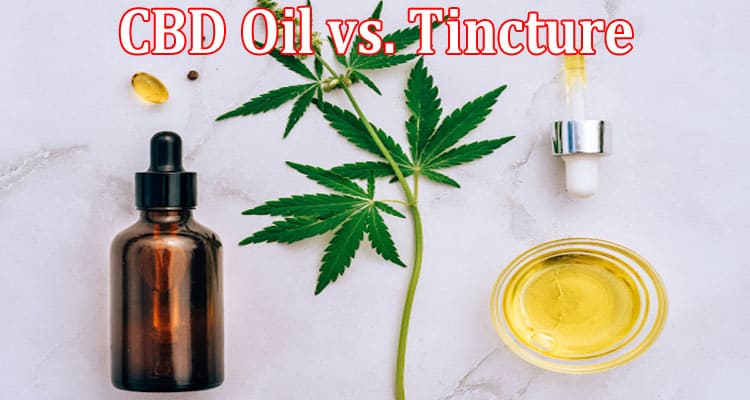CBD Oil vs. Tincture: Differences and How To Choose
The most common information you will find when you search for CBD oil is about CBD tinctures. You might wonder if CBD tincture and CBD oil are the same.
To clear this up once and for all, CBD tincture and CBD oil are not the same. The confusion between the two products started when some companies used the terms interchangeably, especially in late 2017 to early 2018, when hemp/CBD businesses started picking up.
While CBD tincture and oil are packaged identically, there are numerous significant differences between the two. According to a dispensary of CBD in Frisco, here is all you need to know about the differences between CBD oils and CBD tinctures to choose the best one that will suit your specific needs.
What Is CBD?
Before we get to the lowdown on CBD oils and tinctures, let’s talk about CBD first. CBD (cannabidiol) is one of the most active chemicals present in marijuana plants, with the other one being THC (tetrahydrocannabinol). However, unlike the latter, CBD does not have any psychoactive effects. In other words, CBD does not produce that “high” THC is known for.
While THC is known for its “high,” CBD is known for its therapeutic effects and health benefits. These include relief from:
- pain
- anxiety
- depression
- certain types of seizures
- acne
What Is CBD Oil?
As the name suggests, CBD oil is an oil-based product derived from cannabidiol. It is made by simply mixing CBD extracts with carrier oils, like coconut or hemp oil. To enhance the flavor, essential oils are occasionally employed as well.
CBD oils can be taken in various ways. One may ingest it by adding it to foods and beverages; placing a few drops under the tongue; inhaling it using a vape or an e-cigarette; or even applying it directly to the skin to relieve pain or reduce inflammation.
CBD oil is more popular and easier to get than CBD tincture. They are the most common ingredient even in products labeled as “CBD oil tincture” or “CBD tincture.”
What Is a CBD Tincture?
CBD tinctures are alcohol-based CBD extracts. To extract the natural components of the cannabis plant, high-proof alcohol is employed as a solvent in the completed product.
The tastes of cannabis tincture and oil vary significantly. Although alcohol-based tinctures have a longer shelf life (3 to 5 years), they have a reasonably unpleasant flavor. CBD in alcoholic beverages will commonly include 60 to 70% alcohol.
Some tinctures may contain sweeteners, flavorings, or vegetable glycerin to mask the bitterness. Depending on the product’s purpose, certain manufacturers might include extracts of certain herbs, supplements like melatonin, and vitamins in a cannabis-tincture recipe.
CBD tinctures are not commonly accessible owing to their unpleasant taste. Most of the time, a cannabis product advertised as a tincture is just oil, which adds to the consumers’ confusion.
So Which One Is Better? CBD Oil or CBD Tincture?
CBD tincture and oil are both helpful. The critical distinction between CBD oil and tincture is the manufacturing method and the principal component.
Some people prefer CBD oil because the flavor of an alcohol-based tincture is unpleasant. In contrast, others prefer an alcohol-based tincture due to stomach concerns connected with ingesting the oil. It is vital to consider your preferences and goals while deciding which one is best for your needs.
Choosing the Best CBD Oil or Tincture
The availability of CBD tincture vs. oil in mall kiosks and drugstores does not mean they are all safe. Because the FDA does not regulate CBD like it does medications and supplements, it is vital to make an informed purchase.
Whatever CBD product you choose, it is vital to find a reputable CBD manufacturer who provides current and complete certificates of analysis (COA) for all of their products, including the following:
- Potency: The quantity of CBD (and, if applicable, THC) reported on the COA should match the amount given on the label. Because batches differ, it is conceivable that the match will not be exact. However, if it is off by more than 10% to 20%, it may be best to choose a different product.
- Cannabinoid composition: THC will be present in trace levels (usually less than 0.3%) in full-spectrum items. THC should not be present in broad-spectrum products; however, other cannabinoids like cannabigerol or cannabinol, as well as terpenes, may be present. CBD isolate goods must exclusively include CBD.
- Contaminants: These will vary, but ensure that the product has been tested for heavy metals, pesticides, and mold.
- Relevance: Look for a COA no older than a year old. Some businesses may even offer authenticity certifications for each batch of items they sell.
In addition to looking for a company that provides COAs, look for one that is entirely open about its hemp sources (organic, US-grown hemp is preferred) and manufacturing practices. Examine the brand’s reputation, especially whether it has received any FDA warning letters.
Key Takeaway
While the terms are sometimes used interchangeably, CBD tincture versus oil are distinct but have almost identical effects. It all comes down to how soon you want the substance to work and how rapidly you want to take it. CBD oil is absorbed more slowly by your body and may take some time to take effect. On the other hand, tinctures encourage quick absorption and immediate advantages, but this also suggests that the effect may wear out sooner than planned.




